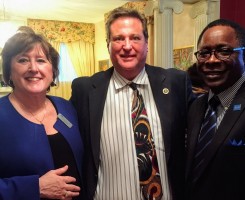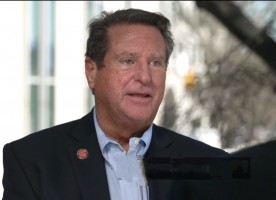It is critical that Tennesseans and Americans trust their election process. Almost certainly, cash is being funneled into obscure organizations in our state to attempt to influence and win elections—and shape future policies.
Our state has been rocked by political scandals throughout our history. One incident -- “The Battle of Athens” has been immortalized for standing up to corruption. In the mid-to-late 1980s, it was illegal bingo that made Tennessee the center of corruption in a scheme called Operation Rocky Top. Operation Tennessee Waltz followed in 2005, which saw seven Tennessee state lawmakers arrested. A former Tennessee Speaker of the House, Glen Casada, awaits trial on bribery and kickback charges later this year. Public corruption cannot be tolerated nor its impact on public policy.
It is easy to observe that teacher unions have donated millions to political campaigns, mostly going to Democratic candidates and committees. Since 2010, Democrats replaced Republicans in dark money spending. Nobody likes to talk about the millions spent on private jets, Broadway shows, or luxury retreats by the Republican National Committee. Where did that money come from?
Republicans and Democrats are often indistinguishable at the national level. Swamps exist outside of Washington DC. Huge dollars flow into political campaigns and parties across our state and nation. We hardly bat an eye at the massive costs of political campaigns or who is influencing them, and polarization and partisanship have increased, and free, open, and civil exchanges of ideas to improve the lives of citizens have decreased.
Political consultants, strategists, and an assortment of pollsters, advertisement creators/buyers, pollsters, and hangers-on will get paid by both political sides. Most consultants don’t care about basic issues facing everyday citizens like education, health care, fiscal and regulatory issues, housing, transportation, and economic opportunity.
Politicians know who is pulling their strings--donors. If we want to avoid an absolute subversion of our political system, we must insist on immediate disclosure of where donations come from. If we prevent dark money flow to groups controlled by or promote elected officials, we could restore greater integrity to our system. We need better regulation over union political spending as well. We need to look at greater transparency. People are free to give what they want, but everyone should know who donated. Remember, large political donors expect political paybacks after elections.
Voters should also know who is spending political money, when, where, how, and for whom. We need greater transparency on who is funding political candidates and parties and the organizations and entities behind them. There must be a documented paper trail on all political campaigns and political activities. This is well beyond free speech.
Right now, we have the best government money can buy, with a designed lack of transparency fueled by unions and dark money. This last election cycle we witnessed an influx of unaccountable cash, known as dark money, which pours into our state. Because of unchecked and non-transparent political bribery, we have created a political oligarchy with limitless power. Political participation is disturbingly low for voters.
Steve Cavendish wrote an excellent article when he was at the Nashville Scene, about dark money in politics. It is worth noting the message the outsiders bring is almost always negative. The point raised by Cavendish was: “If you don’t think this is an erosion of democracy, you’re not thinking about it hard enough.” Cavendish referenced Walmart, Microsoft billionaires, and unions as the main culprits. We agree. The formula is simple: Dark Money + Union Money = Corrupt Politics.
Transparency is also critical in policymaking. We must be critical consumers of research, before making policy. Who is paying for the research? Where is it from? Can it be replicated? In education, we need Tennessee solutions to Tennessee problems. States by design should look different in education. A one size fits all model does not work. Even before Tennessee became a state, our citizens were concerned about the education of children.
Today we see philanthropists and national foundations influencing our policies and becoming exceedingly political. In some cases, philanthropy could undermine democratic values according to Rob Reich. He adds philanthropy is “largely unaccountable, often perpetual, and lavishly tax-advantaged.”
However, there is little doubt that philanthropy has solved some important problems in this world. Policymakers and stakeholders alike must avoid government overreach in many policy areas. However, we must also limit advocacy philanthropy and welcome real public engagement in policymaking decisions. Whether it’s Bill Gates, George Soros, Mark Zuckerberg, Warren Buffett, the Walton Family, or any other philanthropist trying to shape public policy we must begin to push back. Even the Walton Family Foundation is shifting its ideology across the political spectrum.
We need additional media scrutiny to enhance accountability for advocacy philanthropy and the organizations that impact our policies, especially education. We can start by elevating the voices of our own citizens, rejecting out-of-state political donations, real-time disclosure of contributions and expenditures, and making voters aware of who is trying to influence our elections with dark money.
Our founders could never have envisioned a warped system of government bought by the highest bidder, especially by dark money and unions. Joy Pullmann describes it as “a shadow government that pit elected officials against their voters on behalf of moneyed interests.” Policymakers must address dark money and union money in election funding and implement rigorous reporting requirements to ensure greater transparency on political donations. This needs to happen sooner rather than later.
Will they tackle that issue? I doubt it. Too many donors and political consultants will not want to advocate for an accountable government unshackled from the influence of political money. Our politicians should never be for sale to the highest bidder. An informed citizen is the most critical element for good government or better public policy.
When citizens are ignored, hopefully, they will rediscover their voices and remember who created this mess. If we don’t start speaking up, I fear where we are heading as a state and a nation. In addressing this erosion of democracy, we should consider the adage: "Rome wasn't built in a day, but it burned in one." There is no shortage of fiddle players in Tennessee.
##
JC Bowman is the executive director of Professional Educators of Tennessee.













